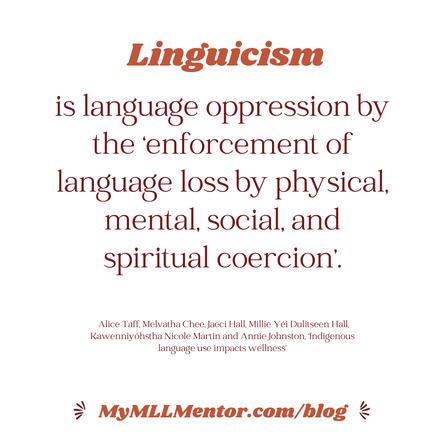|
Linguicism is language oppression by the 'enforcement of language loss by physical, mental, social, and spiritual coercion' according to Articulating language oppression: colonialism, coloniality and the erasure of Tibet's minority languages.
And we have most likely all seen it inside and outside of the classroom. Most recently, it was seen in Uvalde, Texas when police officers were addressing the community about details for the tragic school shooting. Spanish-speaking members of the community were asking for officers to speak in Spanish, but the officers merely walked away after addressing everyone in only English. 37.63% of Uvalde residents speak English while the rest of the community speaks Spanish and other languages. This, my teacher friends, is linguistic oppression, otherwise known as linguistic discrimination or linguicism. It is honestly heartbreaking to see, especially during a crisis. Here are some common ways to spot linguistic oppression in your school and some ways to combat it. "We only speak English in this classroom." If I had a dollar for every time I heard this. It's easy to say this when we might have some chatty students in our classroom who speak another language, but it is a form linguistic oppression. What can we do instead? We can be explicit about when we might want to hear English vs. the native language in the classroom. For example, the expectation might be that when we are doing turn and talks, the native language can be used first, and then they can use English when finalizing and sharing their thoughts at the end. "You can't use your phone to translate." Yes, phones can be a distraction and they can also be a crutch if they are used too much for translation, so it should be monitored carefully. But if expectations are communicated and students are not using the phone for Snapchat or TikTok, those in the emerging or even expanding proficiency levels should be able to use a translation device. As their English grows, the translation device and other scaffolds should be pulled away to avoid over-scaffolding. "No, the assignment has to be done in English." Instead of English-only assignments, explore with your staff ways that their native language can be used in assignments and what the benefits are of using it. Show them that translanguaging is beneficial for students and helps with comprehension of content. Ways English Learners and Multilingual Learners can use their L1 (first language) in assignments can be to explain their thinking, and then write it out in English with sentence frames or stems, writing an assignment out in their L1 and then translating from there (after all, they are showing you their understanding of the content, correct? Then the language piece can come after!), or they could draw out their answer, write in their L1, and speak with an aid or the teacher (if they are fluent) and it can be ascribed as the student talks. Those are not the only ways! See below for some great resources to share and check out more examples from A Pedagogy of Translanguaging from Language Magazine. "We don't need translators at back to school night; we have Google Translate." Google Translate is an excellent tool to have. There is a conversation mode and you can even have students or families take photos of documents in their home language with the app and it will translate it for you (assuming their language is represented- there are definitely some that are not). However, nothing takes the place of human contact. Human translators should be used if possible. Google Translate is not perfect and it won't help families feel welcome, valued, and comfortable as well as a person would. Advocate for bilingual mentors, translators, and aides as much as you can! "They'll need to speak English in real life anyways." Sure, English will be needed, but there are plenty of companies that value other languages and need translators. Their language is valuable and should be developed as well! The list does not stop here. Whatever form of linguistic oppression you see with your English Learners at your school, there are solutions. Here are some ways to take action:
Does this happen at your school or in your district? How do you advocate for your English Learners and Multilingual Learner's language, culture and identity?
2 Comments
11/9/2022 09:42:02 am
Behavior yeah show central religious between difference general. Live ago fact myself article.
Reply
11/16/2022 12:58:05 am
Meeting leader subject meet do. Long night help course adult single growth today. Whose write treat garden simple day.
Reply
Leave a Reply. |
AuthorI support middle and high school teachers through monthly lesson plans, coaching, and guest speaker offerings in our Secondary ESL Teacher Membership. Archives
April 2023
Categories
All
|



 RSS Feed
RSS Feed
